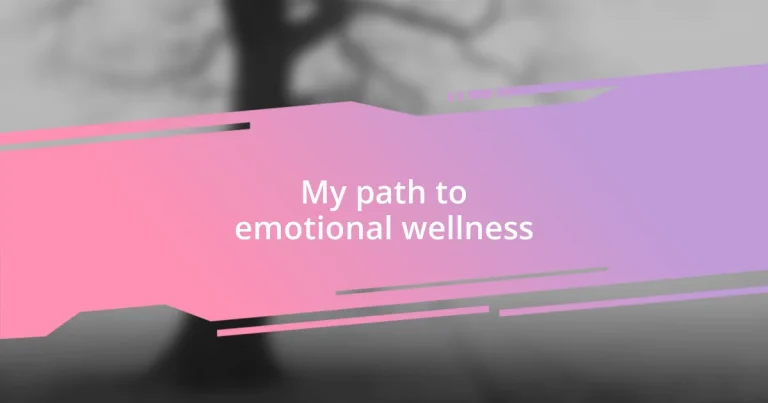Key takeaways:
- Emotional wellness involves recognizing and managing a full spectrum of emotions, enhancing understanding through journaling and reflection.
- Building supportive relationships and sharing vulnerabilities strengthens connections, fostering emotional resilience and well-being.
- Setting realistic, achievable goals and regularly reflecting on progress helps maintain emotional health, promoting clarity and motivation.
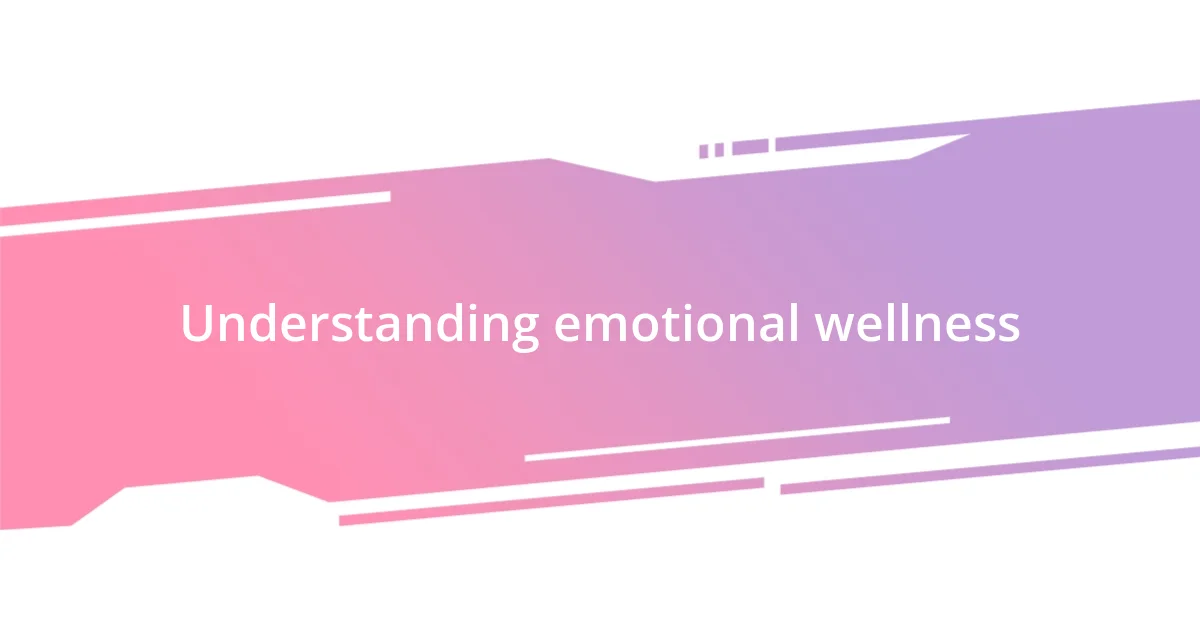
Understanding emotional wellness
Emotional wellness is about understanding and managing our feelings to lead a fulfilling life. For me, a turning point came when I realized that recognizing my emotions was just as crucial as expressing them. Have you ever paused and asked yourself how you’re genuinely feeling in a moment? I remember standing in front of the mirror, grappling with feelings of anxiety before a big presentation, and it dawned on me that simply naming those emotions helped diminish their grip on me.
This journey isn’t just about feeling happy all the time; it’s about embracing the full spectrum of emotions, including sadness, fear, and joy. I recall a particularly tough week when I felt overwhelmed by work and personal issues. Rather than pushing those feelings aside, I decided to journal my thoughts. That process of reflection allowed me to better understand the underlying causes of my discomfort. Wouldn’t it be liberating to view our struggles as stepping stones rather than obstacles?
Moreover, emotional wellness is connected to our relationships. When I made a conscious effort to communicate openly with a close friend about my stress, I discovered how shared experiences can deepen connections. Have you ever shared your burdens with someone and felt an immediate weight lifted? Establishing that vulnerability not only boosted my emotional resilience but also enriched my friendships, reminding me that we’re all in this together.
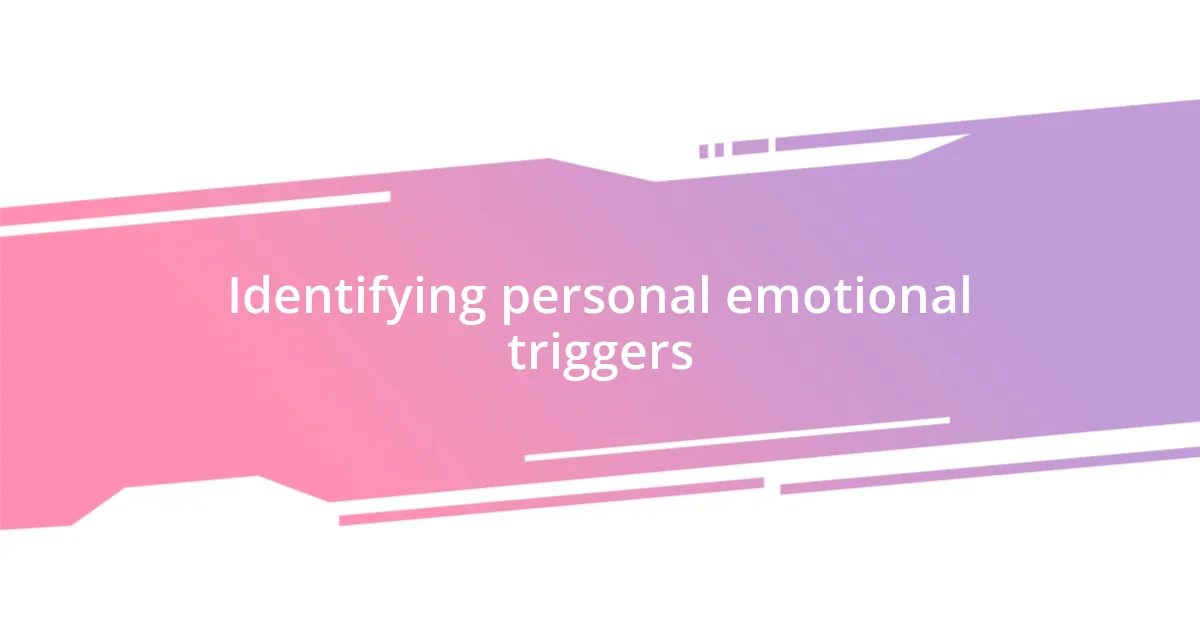
Identifying personal emotional triggers
Identifying personal emotional triggers is an essential step in enhancing emotional wellness. I remember a moment when a seemingly ordinary event—like a casual comment from a coworker—triggered unexpected sadness. In that moment, I realized how certain phrases or behaviors from others could tap into deeper emotions I had unconsciously associated with past experiences. It’s fascinating how our minds connect dots that we might not even recognize at first glance.
To effectively pinpoint your emotional triggers, consider these strategies:
- Reflect on Past Experiences: Think about events or interactions that consistently elicit strong feelings.
- Keep a Trigger Journal: Note down incidents that stir your emotions, along with the thoughts and feelings they evoke.
- Observe Patterns: Look for recurring themes in your emotional reactions over time.
- Ask for Feedback: Sometimes, friends or family can see patterns in your responses that you might overlook.
- Mindfulness Practices: Engage in mindfulness or meditation to enhance your self-awareness and recognize emotional shifts.
By using these strategies, we can better understand ourselves and the mechanisms behind our emotions. I found that simply mapping out my emotional landscape could be a transformative exercise. It’s empowering to take the reins on what influences our feelings!
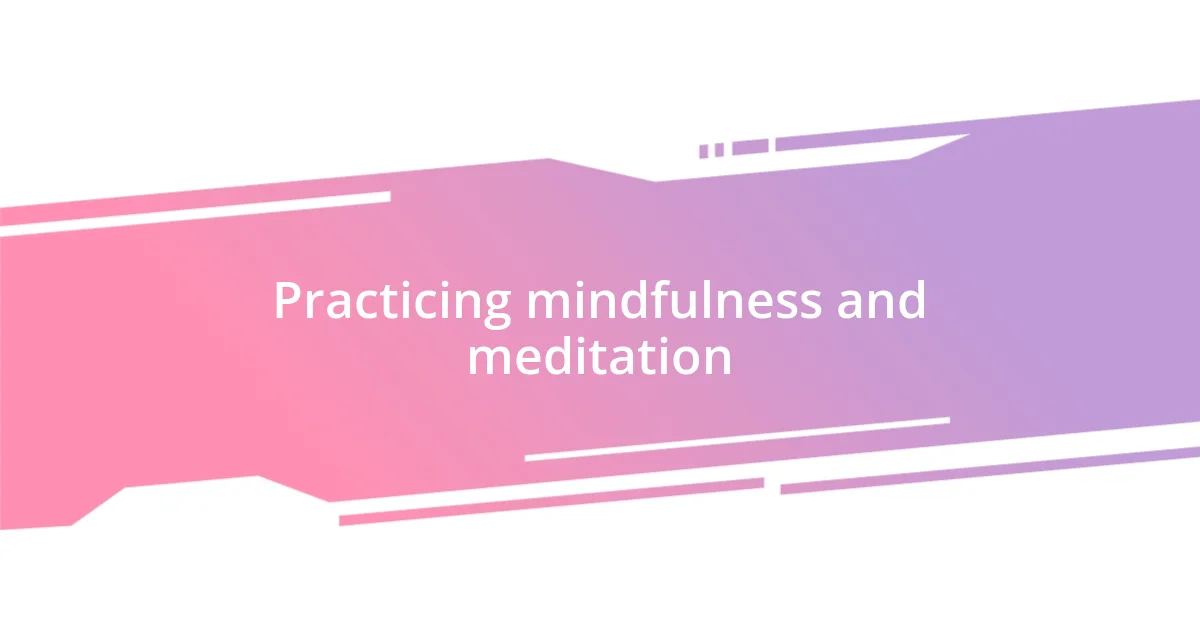
Practicing mindfulness and meditation
Practicing mindfulness and meditation has been a cornerstone of my emotional wellness journey. I remember my first attempt at meditation; it felt both foreign and liberating. As I sat quietly, focusing on my breath, thoughts raced through my mind like a highway rush hour. But something magical happened when I began to just observe those thoughts without judgment. Instead of trying to force them away, I learned to acknowledge them, which brought me a sense of calm and clarity. Would you believe that just five minutes a day initially transformed my approach to stress?
Mindfulness, in particular, helped me become more present in daily activities. I made it a habit to practice mindful eating—savoring every bite of my meals. This simple shift allowed me to engage with the flavors and textures of food, rather than rushing through meals or eating mindlessly while distracted. It was during one of these mindful meals that I truly appreciated how food nourished not just my body, but my soul as well. Have you ever tried slowing down during something so automatic? The experience is both grounding and enriching.
Both mindfulness and meditation enhance self-awareness, opening doors to emotional insight. For instance, while meditating after a long workday, I found myself reflecting on unresolved feelings from past events that I thought I had moved on from. That realization was uncomfortable yet necessary. It gave me the opportunity to address and process those lingering emotions instead of burying them deeper. This practice not only nurtured my emotional well-being but fostered greater resilience in facing life’s challenges.
| Aspect | Mindfulness | Meditation |
|---|---|---|
| Focus | Present moment awareness | Structured mental exercise |
| Benefits | Reduces stress, enhances self-awareness | Increases emotional regulation, calms the mind |
| Practice | Engaging in daily activities with attention | Formal sessions, often in silence |
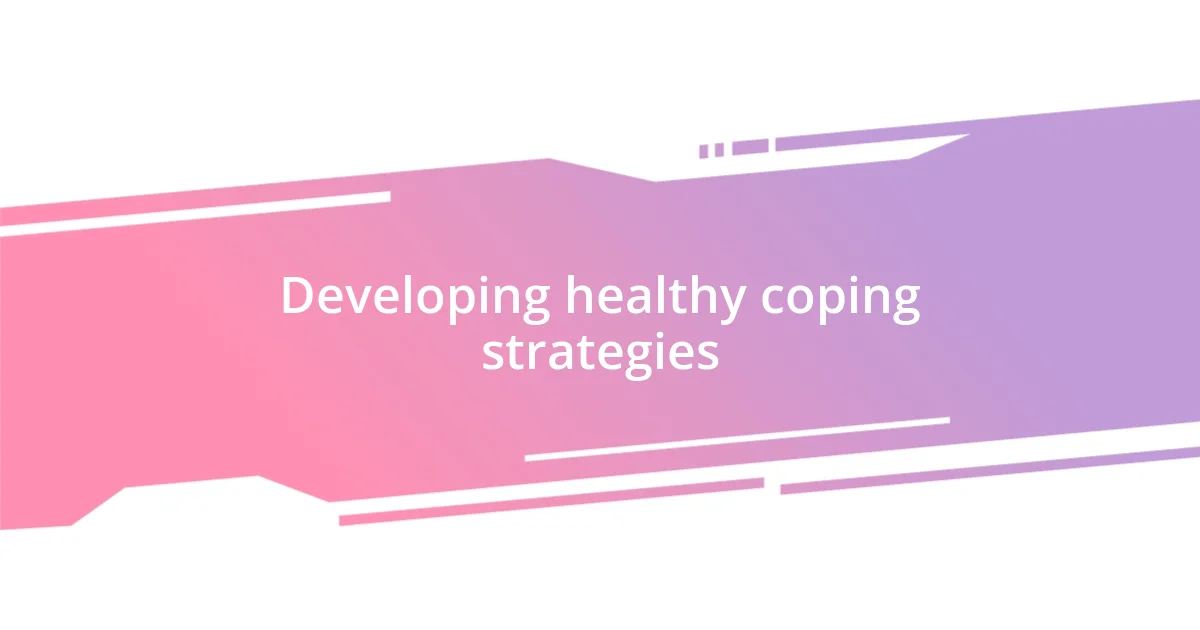
Developing healthy coping strategies
I’ve learned that developing healthy coping strategies can truly shift our emotional landscape. One approach that’s worked for me is engaging in creative outlets, like journaling or painting. I recall one evening when I felt overwhelmed by stress; instead of succumbing to it, I grabbed my paints and unleashed my emotions onto the canvas. It felt freeing to express myself visually, and I realized that creativity can serve as a powerful release—like a valve releasing pent-up pressure.
Moreover, I’ve found that connecting with nature is a fantastic coping strategy. After a tough week, I took a hike in a nearby forest, feeling the crunch of leaves underfoot and breathing in the fresh air. There’s something about being outdoors that really grounds me. I often ask myself, “Why do we forget how rejuvenating nature can be?” Just a simple stroll can clear my mind and refresh my spirit, reminding me that there’s beauty in the world, even amidst chaos.
It’s also essential to establish a support system when navigating emotional challenges. During a particularly tough time, I relied heavily on my friends and family to lend a listening ear. Their understanding and perspectives provided comfort that I couldn’t muster alone. Have you ever noticed how just sharing your burdens can lighten the load? Leaning on others not only fosters deeper connections, but it also cultivates a community of support that bolsters emotional resilience.
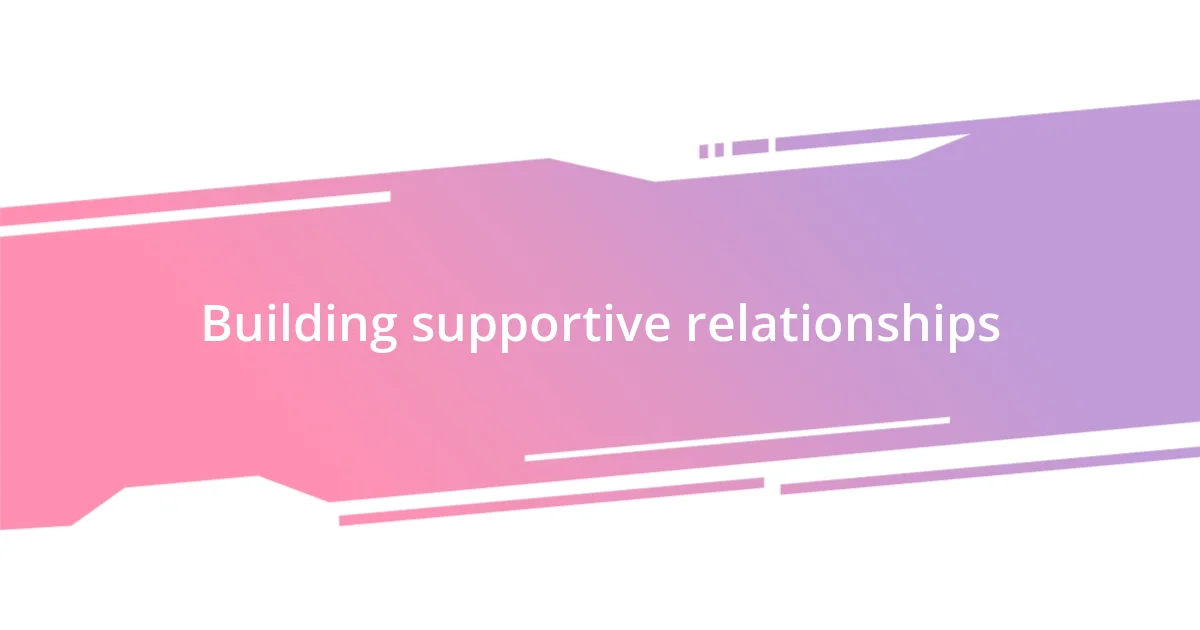
Building supportive relationships
Building supportive relationships has been instrumental in my journey toward emotional wellness. I distinctly remember one evening when a friend reached out during a rough patch. Just hearing her voice and knowing I wasn’t alone made a world of difference. Have you ever felt such relief just from knowing someone cares? Those moments remind me how vital it is to nurture connections with people who uplift us.
I’ve also realized that it’s not just about having friends; it’s about the quality of those relationships. I started spending more time with people who genuinely inspire me, engaging in deep conversations that challenge my perspectives. One night, while sharing stories around a campfire, I found myself laughing and reflecting on my struggles in a whole new light. The warmth of their support was like a soothing balm on my worries. Isn’t it incredible how simply being in good company can shift our mood?
Moreover, I think vulnerability plays a critical role in building strong bonds. For instance, opening up about my struggles with anxiety led to others sharing their own challenges. This exchange created a safe space where we all felt understood and accepted. Isn’t it empowering to realize that sharing our truths can strengthen our connections? In my experience, building supportive relationships is not just essential but transformative in the quest for emotional wellness.
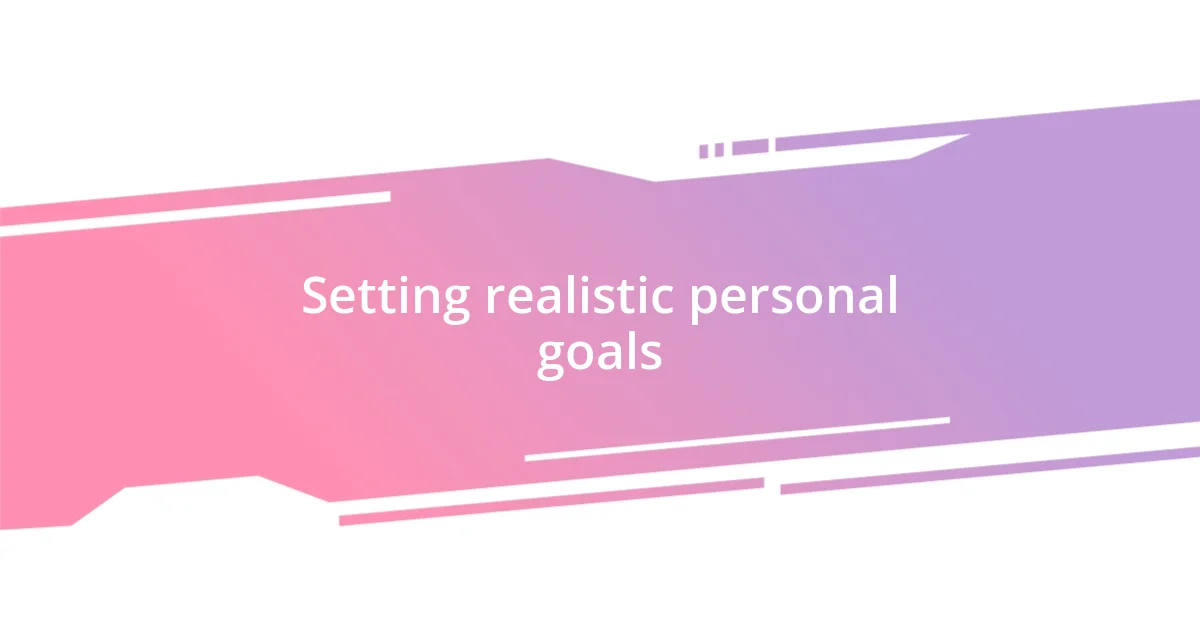
Setting realistic personal goals
Setting realistic personal goals has been a game changer for my emotional wellness. I remember trying to tackle everything at once—a project at work, fitness resolutions, and improving my social life. It all crumbled because my goals were too lofty. Gradually, I learned to break them down into smaller, achievable steps, which brought a sense of accomplishment and kept me motivated. Have you ever felt overwhelmed by ambition? It’s liberating to know that progress doesn’t always mean grand leaps; sometimes, it’s the small victories that count.
I’ve found that clarity in my goals leads to greater satisfaction. For instance, instead of setting a vague goal like “getting fit,” I committed to exercising for just 20 minutes a day, five times a week. Initially, those short bursts felt manageable and not intimidating at all. I recall one day when I was surprised by how energized and vibrant I felt after my workout. I didn’t just exercise; I engaged in a new hobby that made me feel proud. Isn’t it amazing to discover how attainable goals lead to an invigorated spirit?
Creating a vision board was another fantastic tool I embraced. A few months back, I collected images and quotes that resonated with my ambitions and displayed them in a visible spot. Every time I glance at it, I’m reminded of my dreams and the steps I need to take to get there. It’s like having a personal cheerleader in my room! How often do we forget to visualize our goals? I encourage you to explore this technique—seeing your aspirations daily can infuse energy and purpose into your journey. Embracing a realistic approach to goal-setting has empowered me to focus on what truly matters, and I’ve witnessed significant changes in my emotional state.
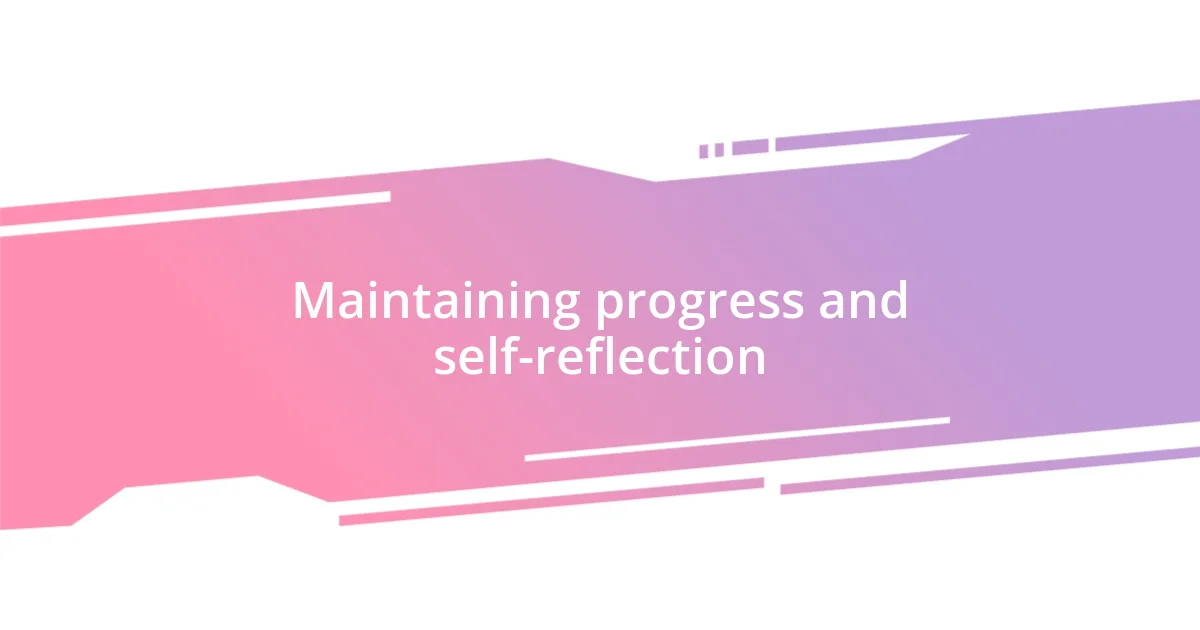
Maintaining progress and self-reflection
Maintaining progress on emotional wellness is an ongoing journey that requires conscious effort. Every week, I set aside time for self-reflection, where I journal about my feelings and experiences. Recently, I wrote about a moment when I felt overwhelmed but made the choice to step outside and take a long walk. That simple decision provided clarity and reminded me how vital it is to recognize my emotional state and the actions I can take to uplift it. Have you tried journaling? It can be a powerful tool for understanding your own emotional landscape.
In addition to writing, I periodically revisit my goals, assessing where I stand and what I’ve learned along the way. One week, I realized I was sidestepping my sleep routine amid a busy schedule, which affected my mood. I decided to prioritize getting adequate rest and noticed an immediate improvement in my overall well-being. It’s fascinating how small changes can lead to significant advancements in emotional health. What adjustments can you identify in your routine that could make a difference?
I find that discussing my reflections with someone I trust has been incredibly beneficial. A good friend of mine surprises me during our catch-ups by asking insightful questions that push me to dig deeper into my thoughts. Last month, I shared a struggle that had weighed heavily on me, and our conversation helped unveil unexpected solutions. Isn’t it amazing how our connections can foster greater self-awareness? Leveraging relationships in this way not only maintains my progress but also enriches my emotional journey.












